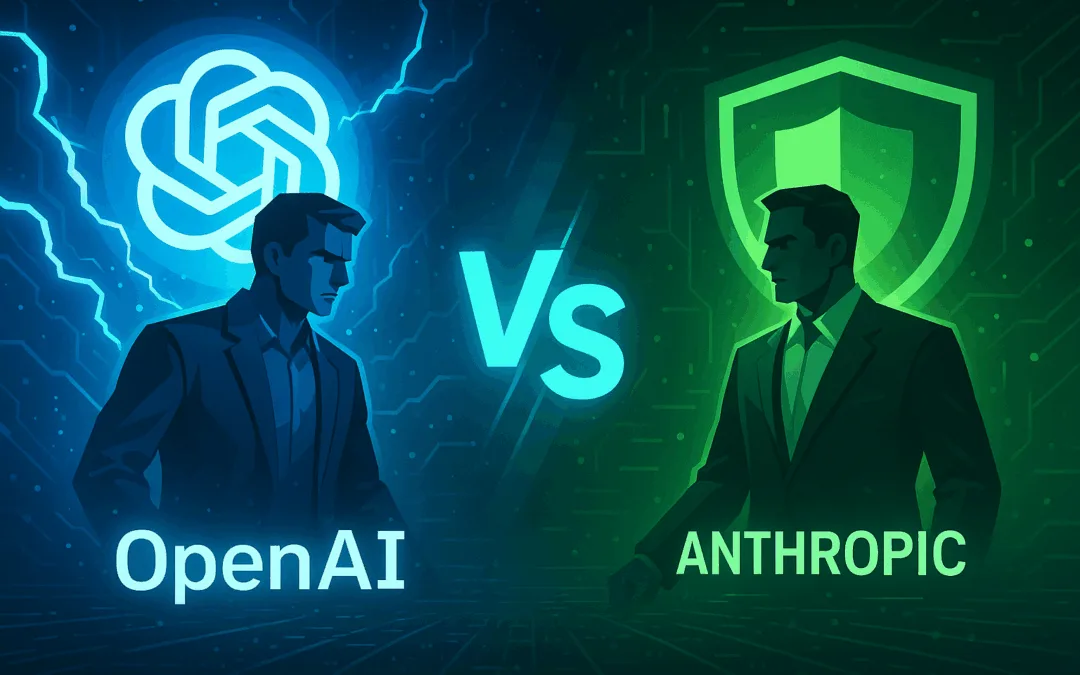
Votre entreprise peut-elle encore ignorer l’IA générative ?
L’IA en entreprise : état des lieux 2025
Si vous pensiez que l’IA générative était encore une tendance émergente, les chiffres 2025 vont vous faire changer d’avis. ChatGPT écrase le marché français avec 60% de parts, l’adoption en PME explose (+60% en un an) et vos concurrents prennent déjà de l’avance. Mais attention : cette révolution creuse des fractures majeures qu’il faut absolument maîtriser.
L’écrasante domination de ChatGPT : game over pour la concurrence ?
59,2% de parts de marché pour ChatGPT en France. Autant dire que quand vos collaborateurs pensent IA, ils pensent OpenAI. C’est 4 fois plus que Microsoft Copilot (14,4%) et Google Gemini (13,5%) !
Cette domination n’est pas un hasard. L’effet « first-mover » combiné à une interface redoutablement simple a créé un réflexe utilisateur quasi-impossible à casser. Vos équipes ont appris l’IA avec ChatGPT, elles continuent avec ChatGPT.
Mais une surprise française émerge : Mistral AI grignote 6% du marché. Notre pépite parisienne, valorisée à plus de 2 milliards d’euros, représente le seul espoir de souveraineté numérique face aux géants américains. Pour une PME française, c’est stratégique : conformité RGPD native, données hébergées en Europe, support en français.
Le verdict : diversifiez vos outils, mais intégrez ChatGPT Teams dans votre stack. C’est devenu aussi indispensable qu’Office il y a 20 ans.
La vérité qui dérange : vos équipes ne sont pas toutes égales face à l’IA
86% des Français connaissent l’IA générative, mais seulement 25 à 45% l’utilisent vraiment. Et cette moyenne cache une réalité brutale pour les dirigeants.
La fracture générationnelle explose :
- 85% de vos collaborateurs de moins de 25 ans maîtrisent déjà l’IA générative
- Seulement 31% des plus de 35 ans l’utilisent
Un écart de 54 points qui s’est encore creusé de 17 points en un an !
Concrètement, qu’est-ce que ça signifie pour votre PME ? Vos jeunes talents gagnent déjà 5-6 heures de productivité par semaine grâce à l’IA, pendant que vos managers expérimentés perdent du terrain. Si vous ne formez pas vos seniors rapidement, vous allez créer une hiérarchie inversée ingérable.
La géographie compte aussi : 59% d’adoption en Île-de-France contre 34% en zones rurales. Si votre PME n’est pas implantée dans une grande métropole, vous partez déjà avec un handicap concurrentiel.
PME françaises : la course au rattrapage est lancée
31% des TPE-PME utilisent désormais l’IA générative (contre 15% l’an dernier). On double, mais on reste 3 points sous la moyenne européenne. La France rattrape, sans encore dominer.
Les secteurs qui gagnent :
- Information-communication : 42% d’adoption (+12 points en 1 an)
- Activités spécialisées : 17%
- Immobilier : 14%
Les usages qui dominent :
- Rédaction de contenus (68% des entreprises utilisatrices)
- Marketing-ventes (28%)
- Processus de production (27%)
Le paradoxe français : 43% des salariés utilisent l’IA au travail, mais seulement 9% des entreprises fournissent des outils dédiés. Résultat ? Vos équipes utilisent ChatGPT gratuit avec vos données confidentielles. Bravo pour la sécurité…
Qui sont vos « power users » (et pourquoi ça compte)
Le profil type : homme, 18-34 ans, diplômé du supérieur, cadre, francilien. Si ça ne ressemble pas à l’ensemble de vos équipes, vous avez un problème de diffusion.
Les chiffres qui comptent :
- Les cadres utilisent l’IA 3x plus que la moyenne (35% hebdomadaire)
- Gain moyen : 5-6 heures par semaine pour les power users
- 62% des postes « augmentés par l’IA » exigent un diplôme du supérieur
Ce que ça révèle : l’IA ne démocratise pas le travail, elle le polarise. Les collaborateurs qualifiés deviennent survitaminés, les autres décrochent. Votre stratégie de formation devient cruciale pour éviter la fracture interne.
2024-2025 : l’année de l’industrialisation
+60% d’utilisateurs en 2024, puis +40,6% en 2025. On n’est plus dans l’expérimentation, on est dans l’adoption de masse.
Ce qui change pour les entreprises :
- 52% des utilisateurs sont encouragés par leur employeur (vs 23% l’an dernier)
- L’usage professionnel explose : 43% utilisent l’IA au travail
- Mais 73% se sentent « démunis » face à ces technologies
Le moment de vérité : vos concurrents forment leurs équipes pendant que vous « réfléchissez encore ». Combien de temps avant qu’ils prennent une avance définitive ?
Position française : entre rattrapage et ambition souveraine
La France n’est pas leader européen de l’adoption (position intermédiaire derrière les Scandinaves), mais elle devient le hub européen de l’écosystème IA. OpenAI, Google, Meta installent leurs centres R&D en France.
Notre avantage : accès privilégié aux dernières technologies + une approche « équilibre innovation-régulation » qui pourrait nous donner un avantage concurrentiel à long terme.
L’État investit : 2,5 milliards d’euros dans la Stratégie Nationale IA, objectif 40 000-100 000 étudiants IA/an, programme « Café IA » pour sensibiliser 2 millions de Français d’ici 2027.
Vos 3 priorités immédiates
1. Formez vos équipes (73% se sentent démunis)
- Focus sur les +35 ans pour éviter la fracture
- Champions IA internes pour diffuser les bonnes pratiques
- Formation continue, pas one-shot
2. Sécurisez vos données
- Stop au ChatGPT gratuit avec vos infos confidentielles
- ChatGPT Teams minimum pour vos équipes
- Politique d’usage claire et respectée
3. Préparez votre organisation
- Gouvernance centralisée des outils IA
- KPIs pour mesurer le ROI dès le début
- Accompagnement du changement pour éviter les résistances
Le plan d’action Gorillias en 90 jours
Phase 1 – Audit (10 jours)
- Cartographie des usages existants (officiels et sauvages)
- Identification des cas d’usage prioritaires
- Sensibilisation direction et managers
- Benchmark concurrentiel
Phase 2 – Pilote (15 jours)
- Déploiement sur 1-2 départements
- Formation intensive des champions internes
- Mise en place des garde-fous sécurité
- Mesure des premiers gains
Phase 3 – Scale (30 jours)
- Extension progressive à toute l’organisation
- Optimisation des workflows IA-augmentés
- Culture IA et partage de bonnes pratiques
- Plan de formation continue
ROI réel : ce qu’économisent nos clients
Agence marketing (25 personnes)
- +60% de productivité sur la création de contenus
- +23% de capacité client supplémentaire
- Équipes moins stressées (moins de tâches ingrates)
PME industrielle (80 personnes)
- -70% de temps sur la documentation technique
- Onboarding nouveaux arrivants accéléré
- Veille concurrentielle automatisée
Les 5 erreurs fatales à éviter
- Laisser faire « en mode anarchie » → Gouvernance centralisée dès J0
- Négliger la formation des seniors → Accompagnement renforcé des +40 ans
- Viser trop haut dès le début → Commencer petit, prouver, puis scaler
- Ignorer les aspects juridiques → Audit RGPD avant déploiement
- Ne pas mesurer le ROI → KPIs définis dès le démarrage
Votre prochaine étape
2025 ne sera pas l’année où vous « réfléchirez » à l’IA. Ce sera celle où vous la déploierez ou celle où vos concurrents prendront une avance définitive.
Les chiffres sont clairs : 31% des PME françaises ont déjà sauté le pas, ChatGPT domine à 60%, et les gains de productivité sont mesurables dès les premiers mois.
Vous hésitez encore ? 3 questions pour vous décider :
- Combien coûte l’inaction ? Si vos concurrents gagnent 5-6h/semaine et pas vous…
- Vos jeunes talents resteront-ils ? 85% des -25 ans maîtrisent l’IA. Sans outils adéquats, ils partiront.
- Votre expertise suffit-elle ? En 2026, il faudra expertise + IA, pas expertise seule.
Chez Gorillias, nous transformons les hésitants en leaders IA.
Notre méthode : audit personnalisé → stratégie sur-mesure → accompagnement terrain jusqu’à l’autonomie.
Résultat garanti : ROI mesuré dès les 3 premiers mois, ou nous continuons gratuitement.
Prêt à passer à l’action ?
Audit IA gratuit de 30 minutes – Découvrez votre potentiel IA et vos quick wins
Sources : IFOP-Talan 2025, Bpifrance Le Lab, INSEE 2024, retours terrain Gorillias sur 200+ PME accompagnées.





